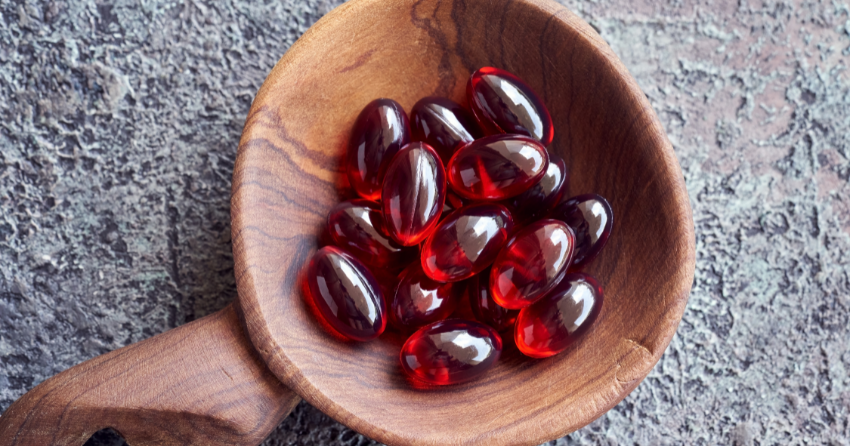Astaxanthin: Powerful Antioxidant For Healthy Aging

We see our ages in our faces: we can see how the years have taken a toll by the condition of our skin. From our skin looking dry and thin to collecting more wrinkles, that skin damage has a common root with our other systems that suffer with age, like our hearts and our brains in the form of oxidative stress and inflammaging. Fortunately, nature has provided us with a potent antioxidant called astaxanthin that can help combat these age-related complications.
Astaxanthin, often referred to as the "King of Carotenoids," is renowned for its strong antioxidant capacity and anti-inflammaging properties. Here’s what it can do for you:
Astaxanthin: An Overview
Astaxanthin is a fat-soluble, reddish-orange carotenoid pigment, naturally synthesized by numerous microalgae, yeasts, and bacteria. Its scientific name is 3,3'-dihydroxy-β, β-carotene-4,4'-dione. This pigment is responsible for giving a reddish hue to seafood like salmon, trout, and shrimp that feed on astaxanthin-producing microorganisms.
The microalga Haematococcus pluvialis is considered the most vital source for bioproduction of astaxanthin. It's worth mentioning that astaxanthin is also produced through chemical synthesis and genetic engineering. However, the biologically derived form of astaxanthin is generally regarded as more bioavailable and beneficial for health.
Astaxanthin is often dubbed the "King of Carotenoids" due to its exceptional antioxidant power. To put things into perspective, it's five times more potent than beta-carotene and a staggering 6,000 times more potent than vitamin C!
Health Benefits of Astaxanthin
Astaxanthin offers numerous health benefits, especially for older adults with age-related challenges to overcome. It is known to promote healthier, younger looking skin, support cardiovascular health, maintain cognitive health, and alleviate tired eyes that don’t focus as well as they used to.
Promotes Healthy Skin Aging
Astaxanthin is the perfect tool to keep in your toolkit for making it impossible for anyone to guess your age.
One of the most sought-after benefits of astaxanthin is its potential to promote healthy skin aging. Free radical production, typically from environmental factors, is responsible for 90% of visible skin aging, such as wrinkles and skin thinning. Astaxanthin, with its potent antioxidant properties, can combat this free-radical skin stress. It acts as an internal shield against damage, enhancing skin photoprotection from UV rays, combating airborne pollution, and maintaining a healthy inflammatory response.
Clinical trials have shown that astaxanthin can delay the impacts of UV exposure. This means less painful, red, puffy skin now and fewer wrinkles later. Furthermore, astaxanthin has been linked to improved skin elasticity, smoothness, and hydration to maintain younger, plump-looking skin into your later years.
Supports Cardiovascular and Metabolic Health
Astaxanthin is known for its potential to support cardiovascular health. It has been linked to improved blood lipid profiles, which can contribute to a healthier heart. Research suggests that astaxanthin can improve metabolic adaptations and promote fat oxidation, thereby supporting cardiovascular health.
Improved ability to burn fat can also support a healthier body composition, which is something many people struggle with as the years pass. Astaxanthin is supportive to mitochondrial health as well, preserving the integrity of this tiny energy-cycling organelle.
Maintains Cognitive Health
Astaxanthin's ability to cross the blood-brain barrier allows it to provide direct antioxidant support to the brain, a feature that is particularly beneficial for maintaining cognitive health, especially in older adults. This unique ability means that astaxanthin can actively combat oxidative stress in brain cells, a key factor in the aging of neural tissues.
The impact of astaxanthin on cognitive functions such as attention, memory, and information processing has been validated through numerous studies. As the brain ages, these cognitive domains often show signs of decline. Astaxanthin's antioxidant properties help in protecting neurons from the damage caused by free radicals, which are more prevalent in older adults due to both environmental factors and the natural aging process.
Helps Tired Eyes
Carotenoids such as astaxanthin support eye health, particularly in the context of modern lifestyles that involve prolonged exposure to screens and other sources of bright artificial light. Astaxanthin supplementation is recognized for its ability to alleviate symptoms associated with tired eyes, a condition frequently worsened by extended screen time.
Astaxanthin helps in reducing eye strain and fatigue, common symptoms for those spending long hours in front of digital devices. Its anti-inflammatory properties can soothe irritated eyes and improve blood flow to ocular tissues. Improved circulation ensures that the eyes receive adequate oxygen and nutrients, essential for maintaining healthy visual function. Moreover, astaxanthin can assist with the ability to focus your eyes more quickly in changing light situations, such as going from bright sunlight into a dim room.
How To Get More Astaxanthin
Astaxanthin can be obtained from both diet and supplements. Sockeye salmon is known for having the highest concentration of this super-antioxidant, with up to 38 mg/kg in wild-caught varieties. This type of salmon has a distinctly deep color owing to its high astaxanthin content, but most people aren’t going to eat anywhere near a kilogram of salmon in a meal.
Astaxanthin is more easily found supplements as the higher concentrations found in capsules can provide more robust benefits than the small amounts found in reasonable portions of food sources. The most bioavailable natural source of astaxanthin is the microalga Haematococcus pluvialis, so be sure to verify the source of any astaxanthin supplement you choose.
The Bottom Line
Astaxanthin is a potent antioxidant that can offer numerous health benefits, particularly for older adults. By promoting healthy skin aging, supporting cardiovascular and cognitive health, and helping tired eyes, astaxanthin can contribute to an improved quality of life, and a longer life as well. So, whether you're trying to stave off the effects of aging or just looking to boost your overall health, astaxanthin can be a powerful addition to your healthy habits.
References:





